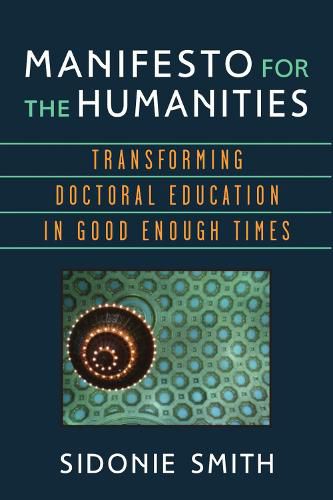Readings Newsletter
Become a Readings Member to make your shopping experience even easier.
Sign in or sign up for free!
You’re not far away from qualifying for FREE standard shipping within Australia
You’ve qualified for FREE standard shipping within Australia
The cart is loading…






After a remarkable career in higher education, Sidonie Smith offers Manifesto for the Humanities as a reflective contribution to the current academic conversation over the place of the Humanities in the 21st century. Her focus is on doctoral education and opportunities she sees for its reform.
Grounding this manifesto in background factors contributing to current crises in the humanities, Smith advocates for a 21st century doctoral education responsive to the changing ecology of humanistic scholarship and teaching. She elaborates a more expansive conceptualization of coursework and dissertation, a more robust, engaged public humanities, and a more diverse, collaborative, and networked sociality.
Grounding this manifesto in background factors contributing to current crises in the humanities, Smith advocates for a 21st century doctoral education responsive to the changing ecology of humanistic scholarship and teaching. She elaborates a more expansive conceptualization of coursework and dissertation, a more robust, engaged public humanities, and a more diverse, collaborative, and networked sociality.
$9.00 standard shipping within Australia
FREE standard shipping within Australia for orders over $100.00
Express & International shipping calculated at checkout
After a remarkable career in higher education, Sidonie Smith offers Manifesto for the Humanities as a reflective contribution to the current academic conversation over the place of the Humanities in the 21st century. Her focus is on doctoral education and opportunities she sees for its reform.
Grounding this manifesto in background factors contributing to current crises in the humanities, Smith advocates for a 21st century doctoral education responsive to the changing ecology of humanistic scholarship and teaching. She elaborates a more expansive conceptualization of coursework and dissertation, a more robust, engaged public humanities, and a more diverse, collaborative, and networked sociality.
Grounding this manifesto in background factors contributing to current crises in the humanities, Smith advocates for a 21st century doctoral education responsive to the changing ecology of humanistic scholarship and teaching. She elaborates a more expansive conceptualization of coursework and dissertation, a more robust, engaged public humanities, and a more diverse, collaborative, and networked sociality.